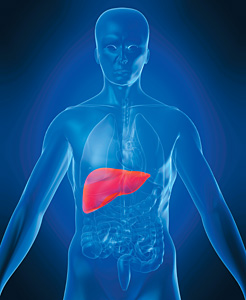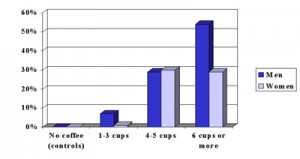Many people drink too much coffee, so you may want to cut down coffee consumption. With all the good news about the health benefits when drinking coffee, some people went too far. They have overdone what was supposed to be good for them. Recently a study came out that tells you how to cut down coffee consumption.
But first I like to review the issue whether to drink caffeinated or decaf coffee. Next I will tell you how you can switch to decaf coffee.
Caffeinated and decaffeinated coffee have the same health benefits
- Recently a large study showed that coffee, caffeinated or not, has a connection with lower overall mortality.
- Coffee has long been a subject of heated discussions. Some praise it, and others condemn it. There are multiple past studies; some showed health benefits, some did not. This is why the Department of Nutrition, Harvard School of Public Health in Boston, MA. did a larger study. The purpose was to re-examine the health benefits for both caffeinated and decaffeinated coffee.
Mortality data regarding people who drank decaf coffee or regular coffee
Researchers assessed mortality among 74,890 women in the Nurses’ Health Study (NHS). Another 93,054 women in the NHS 2 study became part of this. And 40,557 men in the Health Professionals Follow-up Study were also part in this large study. The medium follow-up for all of these three groups was 22.5 years. 19,524 women and 12,432 men died during that time period. Ming Ding is a doctoral student at the Harvard School of Public Health department of nutrition. She was the lead author of this study. She pointed out that in the past there were confounding problems. Many studies had shown that both caffeinated and decaffeinated coffee consumption lowered the risk of cardiovascular disease. But the results in many studies were blurred. Studies often did not distinguish between smokers and non-smokers. This meant that the cardiovascular risk from smoking wiped out a beneficial effect from coffee drinking.
Confounding and other factors
Ding’s studies took this into account and also other confounding factors like how much sugary soda pop people were drinking and whether or not they were eating well. In addition they normalized for other factors that could interfere like drinking alcohol and eating red meat. Without normalizing for the factors mentioned above the study results were as follows. Study participants who had less than a cup of coffee and three cups a day had a 5% to 9% lower risk of dying than those who drank no coffee. Those who drank more than three cups a day did not see any benefit.
Dose response curve for regular and decaf coffee
After eliminating all the confounding factors researchers compared the various groups again, and the following linear dose-response curve emerged:
- Less than 1 cup of coffee per day: 6% lower death rates than non-coffee drinkers.
- 1 cup to 3 cups of coffee per day: 8% lower death rates.
- 3 to 5 cups of coffee per day: 15% lower death rates.
- More than 5 cups of coffee per day: 12% lower death rates.
Coffee consumption reduces diabetes and heart disease
Ming’s study connected with another research paper that had shown that coffee drinkers have a lower risk of developing type 2 diabetes and also less heart disease. She found that both, caffeinated and decaffeinated coffee, reduced the risk of getting diabetes later in life. When asked about what would be responsible for the reduced death rates with coffee consumption, she explained: “There are at least two known chemicals in coffee, namely lignans and chlorogenic acid that could reduce inflammation and help control blood sugar, both of which could help reduce the risk of heart disease”. You may want to cut down coffee consumption because you know decaf coffee does the same as regular coffee.
Other details about the caffeinated/decaf coffee study
Although there seems to be a linear response up to 5 cups of coffee consumption, above 5 cups this linear relationship disappeared. It was not explained whether there was a saturation point, whether there was yet another hidden confounding factor or whether there were detrimental effects on the adrenal glands with too much caffeinated coffee consumption.
Another finding was that it did not matter whether the coffee was regular (caffeinated) coffee or decaffeinated coffee. The results were identical.
Many other studies did not have the large numbers to show whether or not decaffeinated coffee was as effective in preventing heart disease as regular coffee.
Suicide rates and coffee consumption
There was another peculiar finding: suicides were down by 20% to 36%, if a person drank at least one cup of coffee per day. If a person consumed less than 1 cup of coffee per day the suicide rate was 36% higher than the control group with no coffee consumption. This is a rather peculiar finding, particularly for the consumption of less than 1 cup of coffee. Other studies also showed a decrease in suicide rates with coffee consumption.
Although previous studies had shown a reduction in liver and prostate cancer, after the removal of confounding factors this study did not show any effects on cancer causation or cancer death rates with coffee consumption.
Discussion
The Department of Nutrition, Harvard School of Public Health in Boston, MA has excelled in high quality nutritional studies for decades. This study is particularly important, because it is so large, giving it more statistical power. Secondly, the observation time of an average of 22.5 years is longer than most coffee studies in the past. Add to this the removal of the “noise” (called confounding factors) that interfered with the objective of the study, and you end up with a very meaningful result.
Clear results after confounding factors were removed
The important findings were that both caffeinated and decaffeinated coffee have the same effect of saving and extending lives. Perhaps you want to drink not more than 5 cups of coffee per day. That lowers your risk of premature death by 15%. It is most likely that it is the effect of lowering the rate of diabetes and heart attack rates that is responsible for the risk reduction. At least this was the opinion of the chief investigator. Cancer rates were not lowered by coffee consumption.
I sleep better when I drink decaffeinated coffee, so for me the notion that decaffeinated coffee and regular coffee have the same effect was important.
Revisit the statement: “you may want to cut down coffee consumption”
Now we know that there is no difference in benefits whether the coffee is caffeinated or not. Those of you who consume 3 to 5 cups of decaf coffee already enjoy a 15% reduction in risk of cardiovascular disease.
Those of you who take the same amount of regular coffee may get into a caffeine dependency problem. Because every time the caffeine stimulation wears off, you yearn for yet another cup of coffee. You need your fix, and this becomes a dependency problem. You have conditioned your body to that regular dose of caffeine, even though it is the bioflavonoids that are reducing mortality while caffeine is neutral.
My experience of coffee withdrawal
When I came across Ding’s research findings I was glad that now there was clarification about whether decaf coffee was as good as regular coffee. The next step for me was to cut out regular coffee and replace it by decaf coffee. Formerly I had been drinking 5 mugs of coffee daily (translated into 500 mg of caffeine daily). When I decided to quit this habit, I figured I should do it cold turkey from one day to the next. To my surprise this was a much bigger deal than I had thought.
Withdrawal symptoms
I craved the next cup of coffee, and I drank a decaf coffee. It did not help: Still, there was this craving for regular coffee! Yawning, restlessness and tiredness were symptoms that followed me all day long. Then there was irritability, a mild headache and almost flu-like symptoms. Eventually I went to sleep and woke up one hour later feeling a bit more energetic. But two hours later I had to lay down again. I was feeling that bushed. The following few days went better. There was more energy. But I still liked a noonday nap of about 1 hour.
Benefits of getting off regular coffee
This was not like me! Normally I have lots of energy and I don’t need naps. It took me 1-½ weeks to get over my 5-cup a day coffee withdrawal. But it was 100% worth it! Since then my energy is back to normal. I don’t have to chase coffee houses on a trip or ensure there is always a cup of regular coffee available for me at home (work does not apply, because I am retired). If I want I can replace my beloved coffee with another fluid. I love lemon juice sweetened with stevia instead of my decaf coffee. It is liberating that I no longer depend on the caffeine. But I still like the flavor of decaf coffee, and there is something enjoyable about the fragrance of freshly brewed coffee. And so I drink 3 to 4 cups of decaf coffee a day.
How to cut down coffee consumption
Here is a 2016 study from the Johns Hopkins University where 34 patients on 600 mg of caffeine per day received a 1-hour lecture about coffee withdrawal followed by a 6-week diary of their coffee consumption. They were asked to reduce their caffeine consumption down to 50 mg by week 6 of the coffee elimination program. Tests followed with salivary caffeine levels 6, 12 and 26 weeks after coffee cessation. There was also a 1-year follow-up telephone conversation. The results were that there was good compliance. Saliva caffeine levels verified this. The diaries over the first 6 weeks showed that the participants had gradually eliminated caffeine consumption. Perhaps this was a more humane way than my “cold-turkey” approach.
Conclusion
Many people are sensitive to too much caffeine consumption in coffee and other caffeinated beverages. But since the Harvard study that I mentioned above there is no need to overdose coffee or tea consumption. Decaf coffee has the same effect on lowering death rates by 15%, as does regular coffee. It pays to avoid caffeine, as you will avoid caffeine dependency. Drink decaf coffee instead!
I also discussed that withdrawal from regular coffee can be done more gently over a 6 week period. I did it from one day to the next and had a 1-½ week long withdrawal reaction. Do it slower or faster, whatever works best for you. The end result will be the same. Then enjoy it that you no longer depend on caffeine!
More info: https://www.askdrray.com/coffee-could-be-a-lifesaver/












